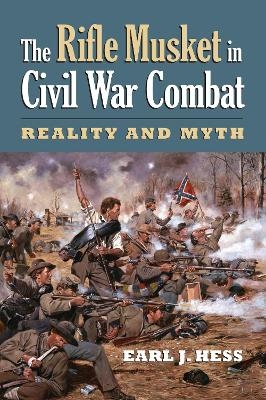
The Rifle Musket in Civil War Combat
Reality and Myth
Seiten
2016
University Press of Kansas (Verlag)
978-0-7006-2383-9 (ISBN)
University Press of Kansas (Verlag)
978-0-7006-2383-9 (ISBN)
- Lieferbar (Termin unbekannt)
- Versandkostenfrei innerhalb Deutschlands
- Auch auf Rechnung
- Verfügbarkeit in der Filiale vor Ort prüfen
- Artikel merken
The Civil War's single-shot, muzzle-loading musket revolutionized warfare - or so we've been told for years. Historian Earl J. Hess forcefully challenges that claim, offering a new, clear-eyed, and convincing assessment of the rifle musket's actual performance on the battlefield and its impact on the course of the Civil War.
The Civil War's single-shot, muzzle-loading musket revolutionized warfare-or so we've been told for years. Noted historian Earl J. Hess forcefully challenges that claim, offering a new, clear-eyed, and convincing assessment of the rifle musket's actual performance on the battlefield and its impact on the course of the Civil War.
Many contemporaries were impressed with the new weapon's increased range of 500 yards, compared to the smoothbore musket's range of 100 yards, and assumed that the rifle was a major factor in prolonging the Civil War. Historians have also assumed that the weapon dramatically increased casualty rates, made decisive victories rare, and relegated cavalry and artillery to far lesser roles than they played in smoothbore battles.
Hess presents a completely new assessment of the rifle musket, contending that its impact was much more limited than previously supposed and was confined primarily to marginal operations such as skirmishing and sniping. He argues further that its potential to alter battle line operations was virtually nullified by inadequate training, soldiers' preference for short-range firing, and the difficulty of seeing the enemy at a distance. He notes that bullets fired from the new musket followed a parabolic trajectory unlike those fired from smoothbores; at mid-range, those rifle balls flew well above the enemy, creating two killing zones between which troops could operate untouched. He also presents the most complete discussion to date of the development of skirmishing and sniping in the Civil War.
Drawing upon the observations and reflections of the soldiers themselves, Hess offers the most compelling argument yet made regarding the actual use of the rifle musket and its influence on Civil War combat. Engagingly written and meticulously researched, his book will be of special interest to Civil War scholars, buffs, re-enactors, and gun enthusiasts alike.
The Civil War's single-shot, muzzle-loading musket revolutionized warfare-or so we've been told for years. Noted historian Earl J. Hess forcefully challenges that claim, offering a new, clear-eyed, and convincing assessment of the rifle musket's actual performance on the battlefield and its impact on the course of the Civil War.
Many contemporaries were impressed with the new weapon's increased range of 500 yards, compared to the smoothbore musket's range of 100 yards, and assumed that the rifle was a major factor in prolonging the Civil War. Historians have also assumed that the weapon dramatically increased casualty rates, made decisive victories rare, and relegated cavalry and artillery to far lesser roles than they played in smoothbore battles.
Hess presents a completely new assessment of the rifle musket, contending that its impact was much more limited than previously supposed and was confined primarily to marginal operations such as skirmishing and sniping. He argues further that its potential to alter battle line operations was virtually nullified by inadequate training, soldiers' preference for short-range firing, and the difficulty of seeing the enemy at a distance. He notes that bullets fired from the new musket followed a parabolic trajectory unlike those fired from smoothbores; at mid-range, those rifle balls flew well above the enemy, creating two killing zones between which troops could operate untouched. He also presents the most complete discussion to date of the development of skirmishing and sniping in the Civil War.
Drawing upon the observations and reflections of the soldiers themselves, Hess offers the most compelling argument yet made regarding the actual use of the rifle musket and its influence on Civil War combat. Engagingly written and meticulously researched, his book will be of special interest to Civil War scholars, buffs, re-enactors, and gun enthusiasts alike.
Earl J. Hess holds the Stewart W. McClelland Chair in History at Lincoln Memorial University and has published ten previous books on the Civil War, including The Union Soldier in Battle: Enduring the Ordeal of Combat, also from Kansas, and, most recently, Trench Warfare under Grant and Lee: Field Fortifications in the Overland Campaign.
| Erscheinungsdatum | 05.10.2016 |
|---|---|
| Verlagsort | Kansas |
| Sprache | englisch |
| Maße | 152 x 226 mm |
| Gewicht | 412 g |
| Themenwelt | Sachbuch/Ratgeber ► Geschichte / Politik ► Allgemeines / Lexika |
| Geisteswissenschaften ► Geschichte ► Regional- / Ländergeschichte | |
| Geschichte ► Teilgebiete der Geschichte ► Militärgeschichte | |
| Sozialwissenschaften ► Politik / Verwaltung | |
| ISBN-10 | 0-7006-2383-3 / 0700623833 |
| ISBN-13 | 978-0-7006-2383-9 / 9780700623839 |
| Zustand | Neuware |
| Haben Sie eine Frage zum Produkt? |
Mehr entdecken
aus dem Bereich
aus dem Bereich
neueste Manipulationstechniken als Waffengattung der NATO
Buch | Softcover (2023)
Westend (Verlag)
24,00 €
Deutschlands Schwäche in der Zeitenwende
Buch | Softcover (2023)
C.H.Beck (Verlag)
18,00 €


